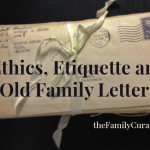I love presents that arrive at my Inbox. The New England Historic Genealogical Society Weekly Digest is one of the best, and it just keeps coming. I always learn something new from the team of researchers at NEHGS; they have a knack for discovering interesting tidbits in the world of family history and genealogy.
This week, in Stories of Interest, I was especially excited to discover a new blog featuring a project with student records from the 1920s.
Permanent Record: Untold Stories from a Stash of Depression-Era Report Cards After Paul Lukas found a collection of report cards from the Manhattan Trade School for Girls, he decided to try to find family members of the students — and then share the experience on his blog and on Slate.website.
The project is obviously a large one, with a host of issues about privacy and ethics. Lukas addresses some of these in a blog post on voyeurism — you know, the thrill of looking at things you aren’t supposed to see — after stumbling on an article about a design company that uses Photoshop-doctored vintage police mug shots for popular paper products. Lukas wonders about about the ethics of his own report card project and what he calls the “moral imperative” of sharing the stories gleaned from those report cards.
All of which makes me think twice about the ethics of family history research and sharing. Most genealogy conferences feature at least one session on the topic of ethics in genealogy. We are familiar with the concepts of protecting the privacy of living relatives and using discretion with information that could prove hurtful or disturbing. But what about the ethics of reworking and sharing the stories of unrelated deceased people you might find interesting or amusing?
I have tried to be circumspect in what I share about my own family, but even so, I know that I have raised the hackles of some relatives. What may like a harmless tale to one person can deeply offend another. And when it comes to unrelated folks, is it “anything goes” or do the same rules apply? What are your thoughts on the subject?






Well, as the "Family Curator," keeper, and writer of the thousands of pages of letters, diaries, and documents my family carefully preserved, labeled and left behind (25 bankers' boxes worth), this is a subject I've been dealing with for the past 10 years, when I first broke open that box and actually started reading the 250 World War II letters between my uncle and his family and friends. Then there's my mother's diaries begun when she was 10 (!) and continued until she died in 1994. My father kept 8 years of diaries — and many more "notes" in his calendars. My grandparents saved their letters from 100 years ago — which I've had deciphered from an unreadable German. I have definitely become a voyeur, but it's given me a lot of understanding. I recently read a great essay in Creative Nonfiction (edited by Bill Roorbach) entitled "The Dead Don't Care." And they don't. They can't. Only the living care. But what if you as the writer care too? Care to write something that reveals a "black sheep" (that definition certainly changes with time), but you make something greater out of it than just a "revelation?' You write an essay in which you explore a universal theme that readers can take away something that enlightens or touches them? I don't think that's wrong. If you're just pointing a finger to say "how awful," what's the point? If you're creating understanding for the human condition, go for it. Those complaining relatives either will get it — or they won't. Seek to understand. (PS to see how I've used these letters, check out my blogsite. Right now I'm publishing 70 year old diary entries of my mother falling in love with my father, and I think they remind us all of how grand love is! How sweet is that!
You are bringing up some good points, here. Some cemeteries "protect" the dead by not posting info online; I wonder how far the "right to privacy" extends?
As for family secrets like black sheep and dark events, those can still haunt folks today. Maybe we have to tread carefully with a plan for the future. A book of family secrets only to be opened…
This is something that I think about quite a bit…My grandmother's family, in 19th century Brooklyn, was absolutely full of black sheep and though I've written quite a bit about them there are a couple of stories from the 1894-1910 period that I hesitate over…haven't written about them – yet. Even though they happened over 100 years ago (my grandmother was born in 1889)…But I really do plan to write a book about this family, they were fascinating people. So I write drafts, and post some of them…and struggle. Maybe I'll give it another few years.
Thanks for writing about this. I think the report cards, being more recent, are a bit dicey.
Privacy is definitely a concern for genealogists, for sure. The idea of the dead having a right to privacy is apretty novel, and legally, the precedent until recently has been that they don't have one. Ethically, however, there are probably details I wouldn't mention publicly about even dead relatives out of respect.
Finding out things about our ancestors and relatives that aren't pleasant is an inevitable part of the process of researching family history…
I have a situation with my Grandfather's sister. She died as a result of an abortion when she was a young teacher. Mother had told me the story and it was confirmed with her death certificate. When I mentioned it to other family members who are my mother's age, they were shocked that I would mention it. When I wrote a family history, I didn't mention exactly how she died but did leave all the details in my family database marked as private. Now I try to be aware of what might be hurt others and mentioned those slowly and delicately. Especially if it concerns one of their direct ancestors. Maybe ask a question such as: Someone mentioned that there was something unusual about how she died, do you know anything?
You have a tough situation, Anita, but I bet it's one that isn't uncommon. My family has "grey sheep" too… it all depends on what's "normal" for the time, I think. I've tried to proceed slowly and not make a big deal out of things. Maybe your MIL will come around as her grandson grows older.
I hope we hear how other folks have handled sensitive situations.
This is a fascinating topic to me; my mother-in-law is very hesitant to share any info on her grandfather, the black sheep of the family. (Really pretty gray, as black sheep go, he wasn't a murderer or anything, just a messy divorce and hard feelings.) She's now especially concerned because her daughter named her son after him, liking the family name, but not knowing any of his history (hidden all these years). MIL is afraid grandson will one day look up his namesake and learn that he wasn't a great example. Unfortunately, there are public records which can tell him this info in about two minutes of searching. So I feel like the life might as well be acknowledged and moved past, instead of swept under the rug and turning into a bigger deal than it is. No living people around to care, just the legacy to deal with. I'd love to hear more thoughts!